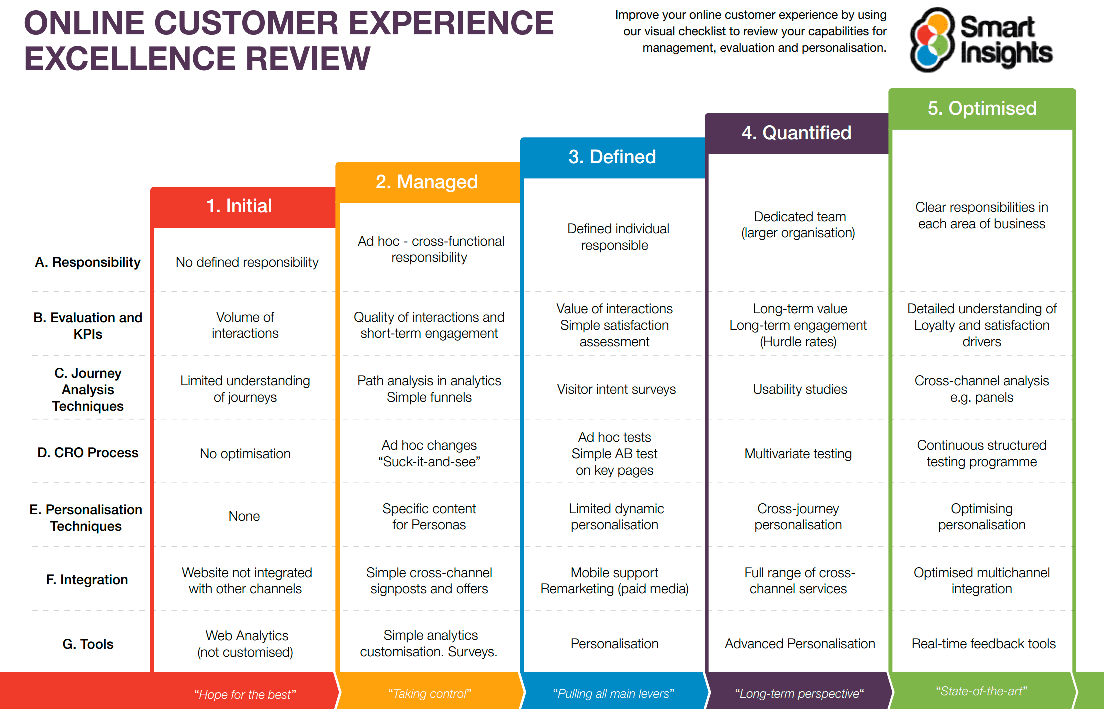Customer expectations are rising fast. Meet them or die.
Today, website visitors expect more than ever before from your website as they compare your user experience against the leaders from different sectors like Amazon, Facebook, HubSpot or Uber. Yet, often there are common flaws in how websites are designed and implemented which means they don't support your communications goals and the customer journey.
While mistakes may not be fatal, if you think of every design or content mistake you make as a defect in the customer journey, that will be repeated thousands of time or more if it's not fixed, it's not going to help you compete since research shows that bad experiences mean that visitors or customers won't return.
The quality of the Customer and User Experiences that businesses deliver through their customer-facing websites is now vital in most industries. The website experience must support the whole customer lifecycle from acquiring customers through to retention and loyalty and will often account for a high proportion of leads or sales.
To help you avoid these mistakes - and correct them - our new free guide explains the most common mistakes we see. It also explains what to do instead so you can create a more effective, persuasive experience.
Download Free Member resource – Common website customer experience mistakes
This free guide is designed to help you review and improve your approach to website design, recognising common mistakes and how to avoid them.
Access the 10 common website customer experience mistakes guide
Customer experience is not just for E-commerce
Naturally the focus of E-commerce used to focus on getting the sale through effective merchandising. Yet customer experience (CX) is a key topic for ecommerce. We’ve seen the rise of Chief Customer Officer (CCO) from startups to global multi-channel retailers like House of Fraser, as organisations recognise the need to create a joined-up user experience across their channels. Amazon famously even went so far as to put an empty chair in every meeting to represent their customer... At the same time, in-house UX teams have evolved quickly, from a traditional UX/UI design unit sat within IT or ecommerce, to a more mature CX team covering skill sets including user behaviour, analytics, customer research, UX design and CRO (conversion rate optimisation).
Today, for most e-commerce sites, it’s no longer enough to provide a functional site; customers demand a high quality of service, with value defined in different ways. Without someone taking ownership of CX, and ensuring that the business has a clear measurement framework for tracking performance and highlighting issues, websites compromise their growth. A good example is page speed, with slow loading sites proven to impact conversion and revenue, especially on mobile devices. Some teams recognise this and ensure that performance optimisation is an ongoing function of CRO, others lag behind and launch sites but have no structured way of measuring the impact performance has on success metrics.
According to Gartner’s report, Critical Capabilities for Digital Commerce, the digital customer experience is a key differentiator for your organisation. Dynatrace’s Worldwide Digital performance Benchmark Report found that in-house marketers report an average uplift in sales of 19% by personalising web experience. With online taking an ever growing share of retail sales, it’s imperative that ecommerce teams understand CX and how to apply good practice learning to provide the best possible user experience.
How does your customer experience rate?
To help assess your online CX we created this review (click for an enlarged version or download this and 8 other digital benchmark templates free) to help you rate your current customer experience and see how to improve.

In addition, our Digital Experience Mistakes guide helps you understand where to focus by highlighting 10 common CX mistakes and providing a strategy recommendation for each. You can use this information to audit your current capability and identify gaps in your CX provision to help influence ongoing development plans.
If you want to know how to combat these costly customer experience mistakes, check out our digital experience toolkit for detailed advice relevant to all businesses.








